Will Putin’s war in Ukraine be a world-changer?
A year after Russia’s invasion of Ukraine, Western leaders are watching China closely even as the Kremlin digs in for a long fight.
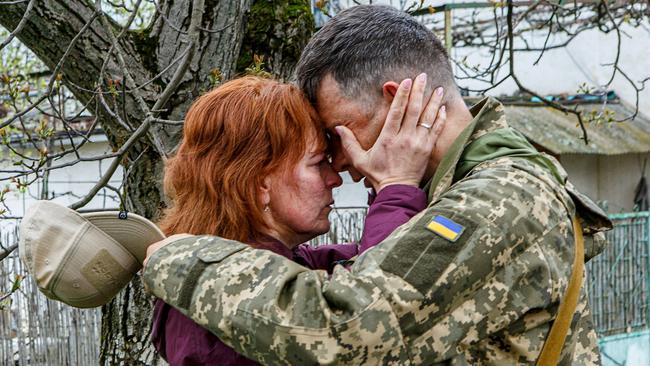
In 12 months, Vladimir Putin’s imperialist ambitions for Russia and fears of NATO’s spread across Europe – three former Warsaw Pact countries are now members – has seen him reshape the continent with Russia’s cruel and costly invasion of Ukraine.
Even close allies China and Iran watch on incredulously as Putin’s clumsy, vicious war machine gets bogged in Ukraine’s east and in the chaos of the Kremlin’s faltering battlefield strategies.
As Finland and Sweden wait only for member approval also to join NATO, and even legendarily neutral Switzerland talks of joint military exercises with its democratic neighbours, it is clear little has gone to Putin’s plan.
Who could have foreseen thousands of patriotic Ukrainians, some in their eighth decade, their livelihoods at home destroyed, heading to the south of England for basic military training? They may have been baking bread or repairing cars this time last year; today they are training to fire a rifle, to kill people, to search dead bodies for booby traps – vital skills if their tour of frontline duty is to last longer than a fortnight. European news broadcasts carry reports of cluster bombs, war crimes and trench battles, all things the Continent thought it had put in the past.
But political and military experts are agreed: the shock of the invasion started last February 24 has worn off and Ukraine’s fightback, led by the tireless, resolute Volodymyr Zelensky, is well established. But critical days approach as winter’s northern snows melt.
Putin will not be taking any backwards steps.
Ukraine’s economy has contracted by 40 per cent and 15 million of its people are displaced, but this is now as much about the future of the Russian Federation.
Stocks of ammunition and missiles are depleted on both sides, but the resolve of NATO members and its allies, including Australia, is steadfast and united.
American military figures are convinced China will pounce on Taiwan in coming years and the US, as well as Australia, has been diplomatically pushing for countries not to be completely distracted by Putin and take their eye off what could be a bigger strategic issue.
And China may move sooner rather than later.
US Secretary of State Antony Blinken warned over the weekend that China was “considering providing lethal support” to Russia.
Such an escalation, added to the armada of Iran-supplied drones, will make a difference.
Blinken expressed “deep concerns” to the Chinese counsellor of state at the Munich Security Conference that China would offer Russia lethal material support.
“To date, we have seen Chinese companies ... provide nonlethal support to Russia for use in Ukraine,” Blinken said. He is concerned that China is about to raise the stakes with weapons and ammunition.
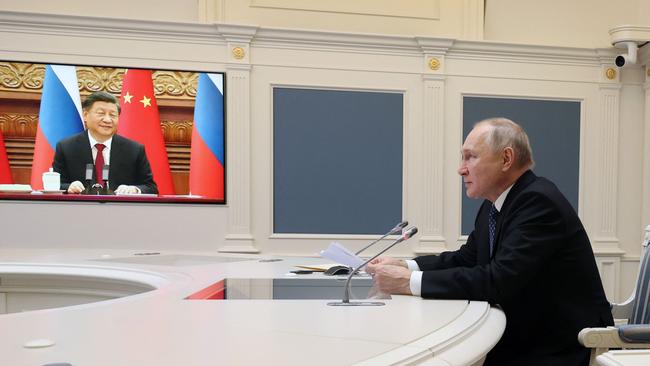
For the West, the supply to Kyiv so far of military hardware worth about $80bn obviously means it must restock while also accelerating support to Ukraine. That’s a challenge.
At the Reagan National Defence Forum, Greg Hayes, chief executive of missile manufacturer Raythenon Technologies, said: “In the first 10 months of the war, we’ve essentially used up 13 years of Stinger production, and five years worth of Javelin production. So the question is, how are we going to resupply, restock the inventories?”
In the UK, which has been Ukraine’s primary moral support, ministers have spoken of the need to carefully calibrate military hardware so as not to weaken its own defences.
If China steps in, Ukraine may become a proxy for East-West divides – then analysts may rethink President Xi Jinping’s ambitions in Taiwan.
Chatham House senior research fellow for China in the Asia-Pacific program, Yu Jie, said widespread sanctions against Russia, and Ukraine’s resilience, might have limited Xi’s options as the country emerges from Covid isolation.
“President Xi and his colleagues have begun to realise that co-operation with Russia comes with substantial limits to avoid under-mining China’s own political priorities and longer-term economic interests,’’ she said. “Nor is its population willing to give up their reasonable living standard and economic liberty for a conflict that brings long-term pain and generational division across the Strait.”
Putin’s high-risk invasion has been damaging to Russia’s economic interests.
Nervous European neighbours have dropped long-term strategic plans, ploughing billions into defence while enduring a cost-of-living crisis. Europe is turning off the Russian gas taps and looking to Africa to shore up supplies; and promising a quick-fire NATO embrace of Finland and Sweden – if Turkey agrees.
Ukraine is also being fast-tracked for possible EU membership.
Australia, also part of the sanctions strategy against key Russian identities and businesses, has donated money and sent the valued Bushmaster troop movers. We are also helping to train novice Ukrainian military in England.
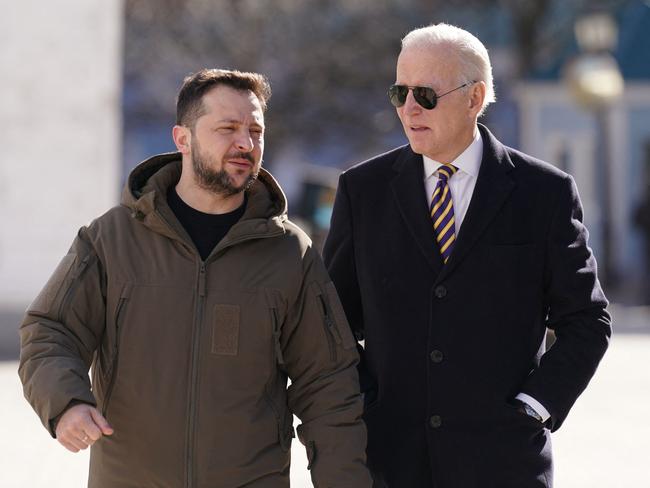
While others mull over providing fighter jets, it is accepted that planning must start on Ukraine’s long-term security once the war has ended. Should a wounded Russia be pushed back to its own borders, it will still be dangerous for a generation or more.
How and when the war may end is a key question.
Analyst Paul Monk, a fellow of the Institute for Law and Strategy, believes the West, led by the American public, might tire of the war sooner than Putin, and that Putin may escalate the conflict with tactical nuclear weapons, perhaps even opening a second front in the Baltic States. A third option might involve Beijing or Tehran creating a distraction that would require a separate US response. And Putin could always intensify his cyber warfare and political subversions.
The West recently boosted Ukraine’s firepower with heavy military equipment, including 300 tanks, long-range missiles, more anti-air missile and anti-drone systems to counter any renewed Russian attack. And Ukraine has retaken about half of Russia’s early territorial gains.
NATO Secretary-General Jens Stoltenberg assessed last week that Ukraine’s war is one of logistics and supply lines.
“We see no signs that President Putin is preparing for peace, what we see is the opposite, he is preparing for more war, new offensives and new attacks,” said Stoltenberg. “This is a grinding war of attrition, therefore a battle of logistics.”
It seems absurd now, but when Russia mobilised its tanks and fighter jets last February it was an attack aimed at subjugating Ukraine within three days. Russia was stretched too far with poor communications for that. So as the war progressed we witnessed the siege of Mariupol and the targeted bombing of maternity hospitals, the butchering at Bucha and other Russian-occupied villages, and the destabilisation of the Zaporizhzhia nuclear plant.
Even though Russia retreated to concentrate on the Donbas and to protect its earlier 2014 territorial claims in Crimea, there have been high casualty rates along a stretched three-pronged front. The Russians have sent into the conflict waves of inexperienced young men, mercenaries and even freed criminals – useful cannon fodder.
For Ukraine the war has been a dramatic, dreadful upheaval.
Former Ukraine broadcaster Pavlo Kazarin joined the Ukraine military on day two, noting in the NATO Review: “Russia’s invasion forced Ukraine to face some existential questions, and now the country is answering in perfect solidarity. Symbolically, Russian hands are knitting Ukraine together, destroying the usual rubbish about the differentness between the west and east of the country.”
In recent months Western countries have ramped up their military production lines. Germany this week announced a new factory to make Gepard ammunition for anti-aircraft guns to help fix the shortfall, and the US revealed billion-dollar contracts for missiles.
Yet the narrative of this war among Western leaders continues to be viewed through the prism of nuclear power – Putin’s ultimate threat.
How far can the West push him back without a catastrophic escalation? Might the West waver?
For a year, NATO and its allies have sought to increase support to Ukraine while publicly distancing themselves from direct involvement.
British defence secretary Ben Wallace insisted this week: “None of the international support is an attack on Russia, or NATO-orchestrated aggression, let alone a proxy war. At its heart it is about helping Ukraine defend itself, upholding international law and restoring its sovereignty.”
Stoltenberg said the support from allies had changed as they responded to Russian tactics. Ukraine has so far survived Putin’s sweeping plans across multiple fronts, the West’s supplies giving Ukraine highly publicised victories against the hapless attackers and forcing a retreat. Moscow then switched to targeting Ukrainian energy and water, and then dug in for the winter.
“At first it was Javelins, Javelins, on anti-tank, light anti-tank weapons, and then we saw the urgent need for artillery and allies started to step up the delivery of advanced modern artillery,’’ Stoltenberg said.
“Then air defence has been a main focus and now heavy weaponry: Strykers, Bradleys, infantry fighting vehicles, mortars from Germany, and also main battle tanks.”
As the British ministry of defence reports: “Russia can barely generate a fighting force capable of retaking lost areas let alone make significant operational advances”.
UK Defence Secretary Ben Wallace has been scathing of the bungling Russians, ridiculing how Russia has failed to achieve any strategic objectives.
“Not one single operational commander then in place on February 24 is in charge now,’’ he said in a recent report to Westminster.
“Russia has lost significant numbers of generals and commanding officers.
“Russian capability has been severely hampered by the destruction of more than 4500 armoured and protected vehicles, as well as more than 140 helicopters and fixed-wing aircraft, and hundreds of other artillery pieces.”
Wallace added that more than 100,000 Russians were dead, its land force effectiveness had plummeted, air force operations had declined to tens of missions a day rather than 300 in the beginning of the war.
And notes Wallace: “Russia’s much vaunted Black Sea Fleet is little more than a coastal defence flotilla.” He added that Britain was helping Ukraine improve its air defence to target incoming Russian-Iranian kamikaze drones.
“We always make sure our support is calibrated to avoid escalation,’’ he said.
This all puts London in the aggressive crosshairs of Russian commentary.
On the day of the Queen’s funeral, retired military commander Andrey Gurulyov called for generals to target London, saying: “Why would we bomb Ukraine or Germany, when there is Britain, the root of evil?” to which host Olga Skabeyeva added: “We should have done it today, all the best people are there for the funeral.”
Last week the arch Putin supporter Vladimir Solovyov reacted to the news Britain was looking into its inventory to see if had spare fighter jets, saying on his top-rating tele-vision show: “Can’t we finally strike London? What is the problem?”


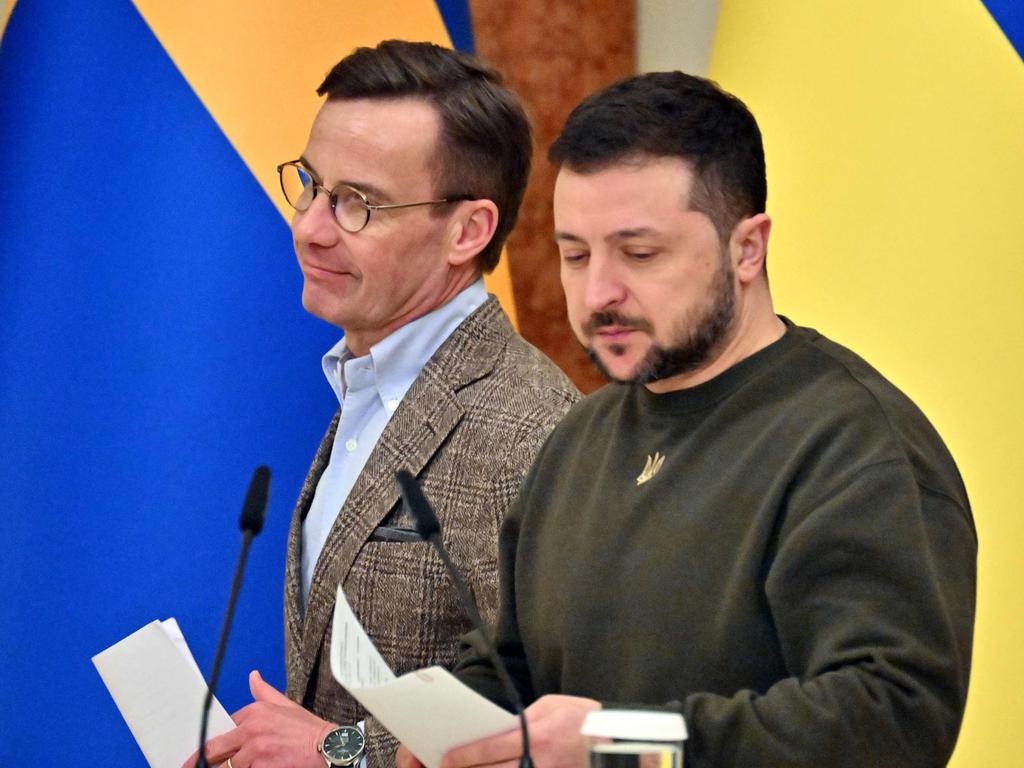

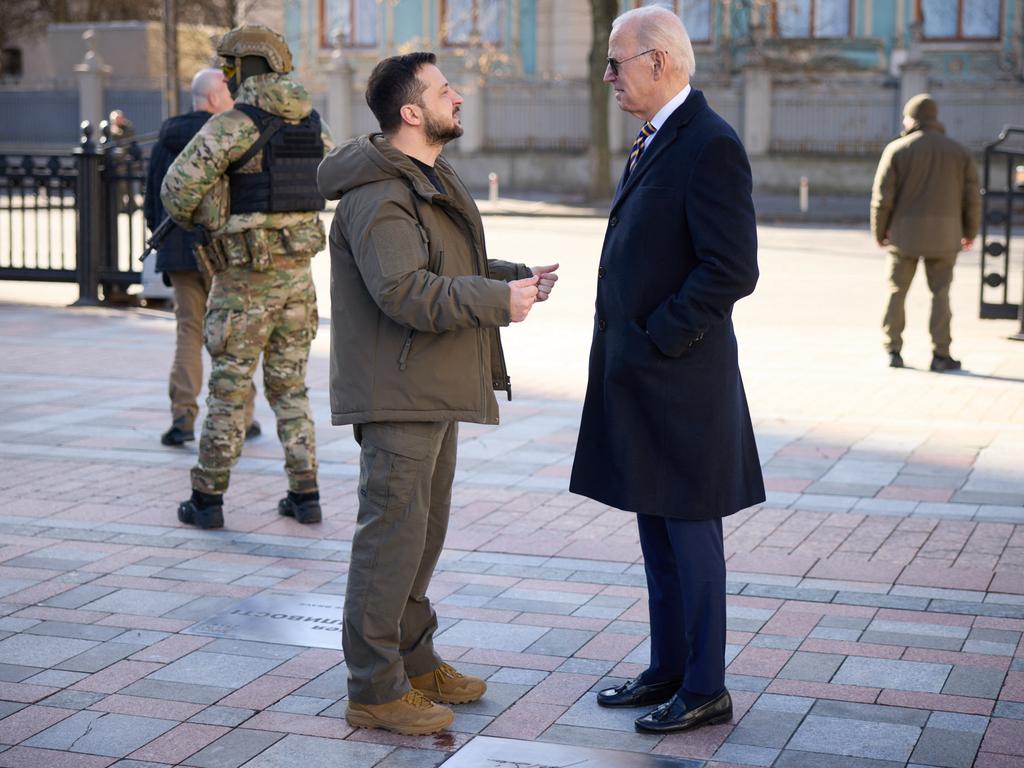
To join the conversation, please log in. Don't have an account? Register
Join the conversation, you are commenting as Logout